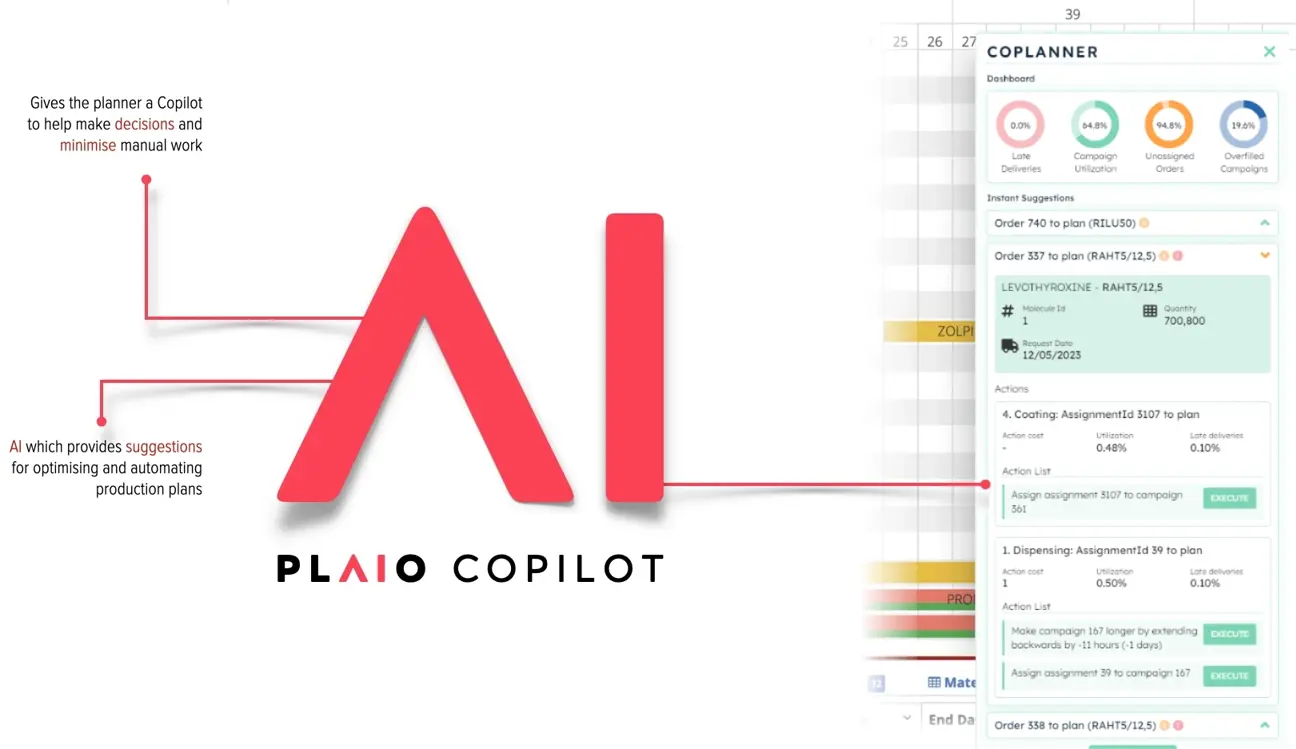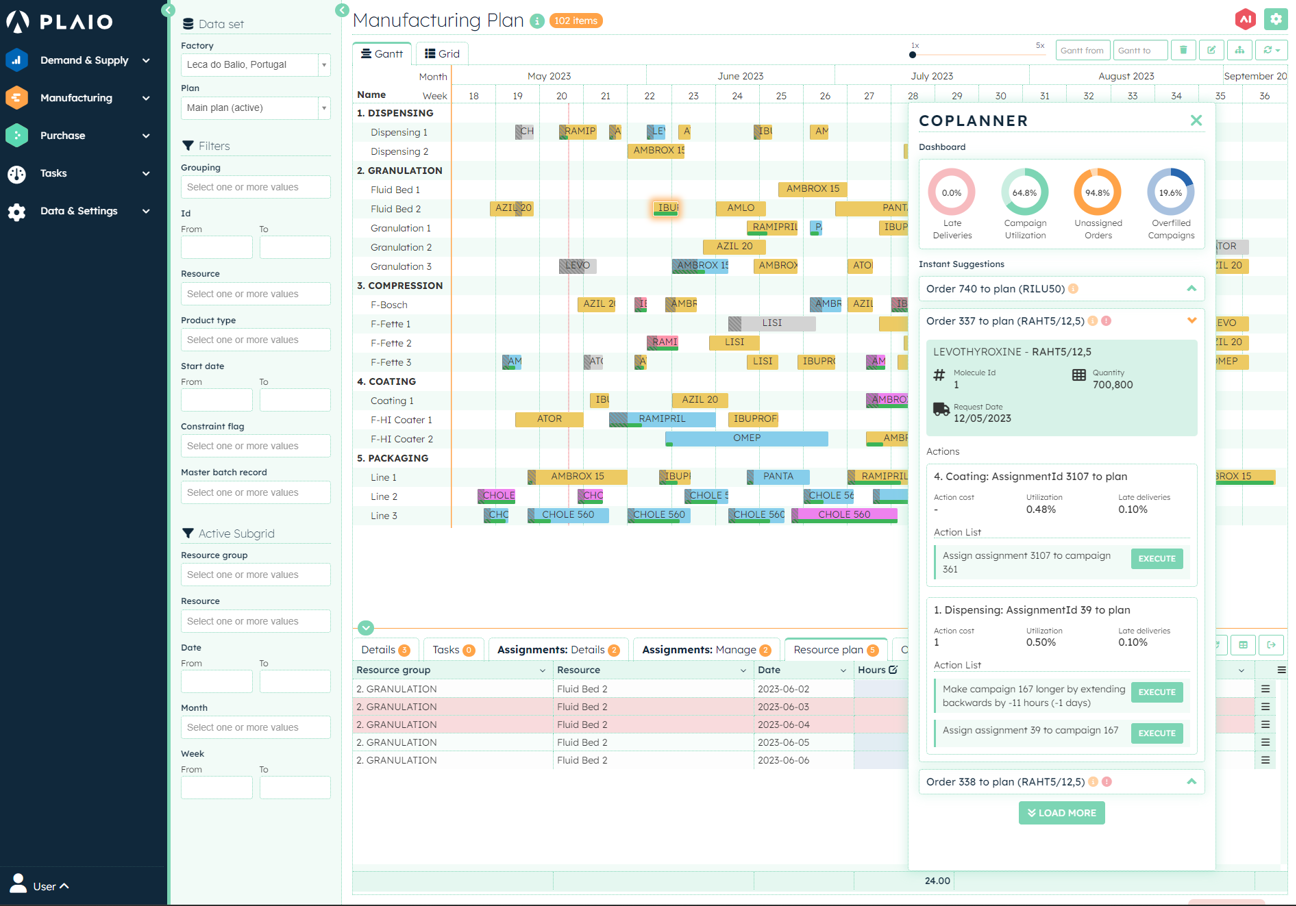PLAIO Coplanner
The Future In Digitalised Planning

There is considerable room for improvement in most pharmaceutical supply- and manufacturing chains. Pharma companies need to be able to react quickly and deliver products, on-time and in full.
Stronger material requirement planning and procurement processes are stretching further than ever before. In today’s environment, with limited supply and prices that are on the rise, the spotlight is on the raw materials, where cost often cuts deep into slim margins.
Conflicting objectives can cause issues, such as the need to maximize resource usage to keep production costs down, while simultaneously striving for a high customer service rate.
Multi-objective decision-making is complex and often difficult for the human mind to deal with. Without a systematic approach, humans tend to base their decisions on only one of the multiple objectives. Herbert A. Simon, the American political scientist who received the Nobel Prize for economics science in 1978, described this in his decision-making theory that explains bounded rationality and how people make decisions within certain limitations.
When humans leave out important objectives, they are likely to accidentally exclude the optimal solutions that the industry urgently needs in the current environment.
So, what are companies to do?
The focus appears to be simple to set: make more for less and optimize at all costs.
Successful planning and scheduling tend to be complex and include many different aspects. Numerous factors, including market knowledge and personal experience, affect the planner’s decisions. As the schedule grows larger, these decisions become more error-prone and difficult to comprehend. Guidelines may not even lead to a near-optimal solution.
In addition to the more complex situations, the planner also must assign straightforward tasks to the plan, which can be both tedious and time-consuming.
The industry is actively looking at solutions for solving this scheduling problem, without disrupting the manufacturing process. Today, most pharma companies’ schedules are still created and maintained manually by the planner, using less-than-ideal software solutions, often spreadsheet-based.
Problems are usually the predictable result.
Complicated spreadsheets are notoriously difficult to debug and maintain, so users tend to tread very carefully in order not to break something that is working well enough. Version control and lack of history often result in companies relying on a single master plan, without any obvious or easy ways to perform what-if-analysis, or algorithms to suggest improvements to the plans.
Hence the manufacturing plans are usually sub-optimal, difficult to maintain, and hinder necessary responses to changes in the environment.

Modifying the traditional manufacturing workflow means replacing manual spreadsheet calculations with automation and replacing email communications with a built-in communication tool and functional BI-user interface.
Enhanced production scheduling tools can improve decision-making, save time, and have a significant impact on the bottom line.
This is where the PLAIO Coplanner comes in.
For the planner, full control of the schedule is important. PLAIO’s Coplanner is therefore designed not to take over, but to suggest better solutions and automate straightforward tasks.
Planners are often faced with choices where there is no obviously correct answer. These are not situations where computers should make autonomous decisions. Instead, the expert planners should always have the final say. A key strength of the Coplanner is the ability to give the planner options and suggestions and help clear up obvious and repetitive tasks. The Coplanner gives the user the ability to review and pick-and-choose from its suggestions using a simple user interface.
The Coplanner considers all important objectives simultaneously and can be used by the planner to overcome the limitations of human decision-making, including bounded rationality.

The Coplanner will assist the planner with various data-driven quantitative methods supporting decision-making, ranging from very simple rule-based methods to more advanced artificial intelligence and optimisation-based methods for planning and scheduling. The quantitative methods result in suggestions that are classified in three categories;
These methods used by the Coplanner will reduce manual labour significantly, saving time and resources, while eliminating various tedious and repetitive tasks. The Coplanner will also help improve the planner’s decisions, with more insight into the advantages of different solutions.
In the current business environment, the Coplanner can help promote the planner from passenger to pilot.
To enhance your experience on our site and to analyze traffic, we use cookies. By clicking "Accept All," you agree to the storing of cookies on your device for analytics purposes. You can manage your settings or learn more in our Privacy Policy.
We use cookies to improve your browsing experience and analyze how our website is used. These cookies allow us to understand trends, monitor website traffic, and gather insights to make the site better for you.
We respect your privacy and are committed to transparent data usage.
Necessary Cookies: These ensure that the website functions properly.
Analytics Cookies: These help us track site traffic, user behavior, and performance metrics. The data collected is anonymous and allows us to continuously optimize the site.
Preferences Cookies: We may use cookies to remember your preferences and tailor your experience.
Marketing Cookies: We may use cookies for marketing purposes.
By clicking "Accept All," you consent to the use of all cookies. If you prefer, you can customize your choices and opt out of certain cookies. You can learn more about how we handle data and cookies in our Privacy Policy.